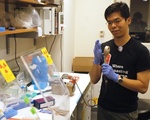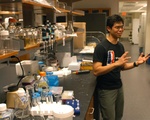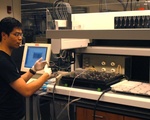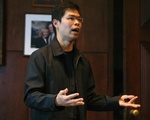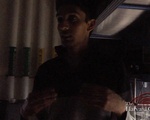Science
Our Carbon Footprint
In July 2008, University President Drew G. Faust challenged Harvard to reduce all greenhouse gas emissions by 30 percent from the 2006 baseline level within the next decade.
Image
Low shows off the pipetting robot Professor Erin O'Shea's lab, where he has worked since fall semester of his freshman year.
Image
Cher Heang ("Shawn") Low '11 presented his thesis on the effects of temperature on the body's internal clock proteins Monday night. Though he is only a junior, Low has already completed a thesis.
Image
Cher Heang ("Shawn") Low '11 tests himself for radioactivity before leaving the radioactive "hot bench" in his lab. Low has already finished his research thesis.
Physicist’s Stolen Nobel Still Missing
Though the man responsible for breaking into the home of Harvard Physics Professor Roy J. Glauber ’45 was arrested on ...
Myth Busters Defend Logic
Adam Savage and Jamie Hyneman—famous for blowing things up and testing popular myths on their show “MythBusters”—were honored for their work in propagating humanist values Friday evening by the Harvard Secular Society and the Harvard Humanist Chaplaincy.
Panelists Talk Science, Ethics
Mixing DNA and Descartes, the panel discussed how developments in evolutionary biology and the mind sciences should be applied to law, philosophy, and economics.
Diabetes Treatment Advances with Trial of Artificial Pancreas
A group of Massachusetts researchers has successfully completed the first run of human trials of the latest artificial pancreas design—a development that will free type 1 diabetics from relying on daily insulin injections.
Risk Factors Affect Life Expectancy Disparities, HSPH Researchers Say
Life expectancy disparities among people of different socio-economic, geographic, and racial backgrounds can be explained by different modifiable habits and health issues, researchers at the Harvard School of Public Health reported last month.
Harvard To Institute Research Ethics Training
Harvard has instituted a new policy that requires all science students conducting research to receive ethics training, University officials say.
Lab Rat of the Week: Vijay Jain '11
Vijay Jain ’11 has found a medium in which he can combine his two loves, chemistry and physics.



